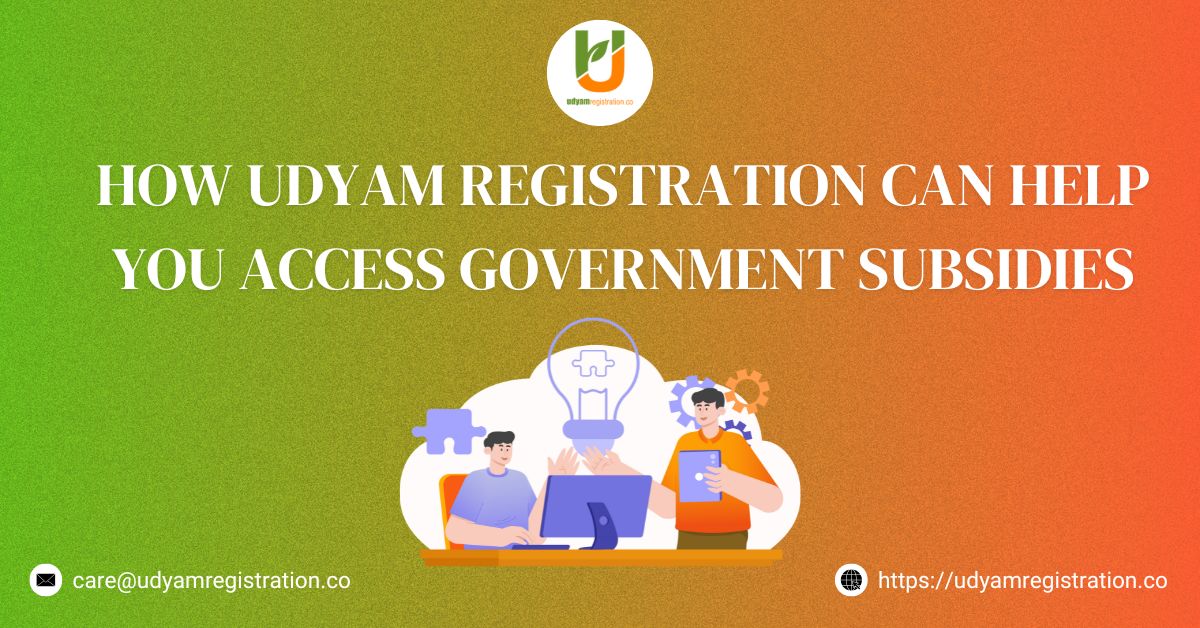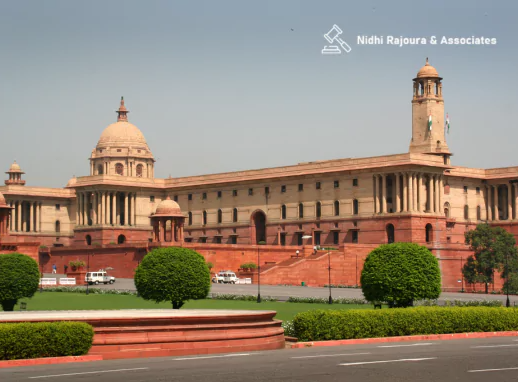Udyam Registration is a government-initiated process aimed at formalizing and supporting small and medium-sized enterprises (SMEs) in India. This registration provides businesses with a unique identification number, making them eligible for a variety of benefits, including easier access to government subsidies. Understanding how Udyam Registration opens doors to these subsidies and how it benefits your business is crucial, especially for MSMEs (Micro, Small, and Medium Enterprises) looking to scale, innovate, or simply sustain themselves in competitive markets.
Introduction to Udyam Registration
Launched by the Ministry of Micro, Small and Medium Enterprises (MSME) in India, Udyam Registration replaced the older Udyog Aadhaar system on July 1, 2020. Udyam Registration aims to provide a simplified and efficient way to classify MSMEs, bringing them into a single unified database. By registering, businesses gain an official identity and become eligible for an array of government schemes and financial benefits designed to encourage growth and resilience.
Eligibility Criteria for Udyam Registration:
- Micro Enterprises:
Investment in plant and machinery or equipment should not exceed INR 1 crore, and turnover should be below INR 5 crore.
- Small Enterprises:
Investment in plant and machinery or equipment should not exceed INR 10 crore, and turnover should be below INR 50 crore.
- Medium Enterprises:
Investment in plant and machinery or equipment should not exceed INR 50 crore, and turnover should be below INR 250 crore.
The Importance of Udyam Registration for MSMEs
The Udyam Registration process is essential for MSMEs as it provides recognition by the government, giving businesses access to formal financial systems, tax reliefs, and subsidies. This registration is particularly helpful for small businesses that face challenges accessing loans, grants, and technical support due to a lack of formal recognition.
By formalizing MSMEs, Udyam Registration enables the government to identify and support these businesses effectively, ensuring that they contribute to economic growth, innovation, and job creation.
How Udyam Registration Facilitates Access to Government Subsidies
One of the primary advantages of Udyam Registration is the access it grants to various government subsidies. These subsidies are available in different forms and cater to a wide range of business needs. Here are the key subsidies that businesses can access through Udyam Registration:
a) Credit Linked Capital Subsidy Scheme (CLCSS):
- The CLCSS offers MSMEs subsidies on loans used for technology upgrades and modernizing equipment.
- Eligible businesses can receive up to 15% subsidy on their loan amount, with a cap of INR 15 lakh.
- The scheme supports MSMEs in industries such as manufacturing, food processing, and textiles, enabling them to remain competitive in the global market.
b) Interest Subsidy on Loans:
- Many states offer interest subsidies to MSMEs registered under Udyam.
- This subsidy reduces the effective interest rate on loans, making it more affordable for businesses to borrow capital for growth.
- State governments also offer subsidies on power tariffs, land lease rates, and raw materials, creating a more conducive environment for MSMEs to operate.
c) Technology and Quality Upgradation Subsidy Scheme (TEQUP):
- This subsidy supports MSMEs aiming to improve their technology, processes, and product quality.
- The scheme offers financial assistance to MSMEs for adopting energy-efficient technologies.
- By encouraging quality improvements, TEQUP aims to make Indian MSMEs globally competitive, helping them meet international standards.
d) Marketing Assistance and Export Promotion Subsidy:
- Udyam-registered businesses can access financial assistance for participating in international trade fairs, exhibitions, and buyer-seller meets.
- This scheme encourages MSMEs to expand their market reach, focusing on export promotion by helping them compete globally.
- The government subsidizes up to 75% of the expenses incurred by MSMEs for participating in such promotional activities.
e) Government Purchase Subsidy:
- The Indian government has mandated a 25% procurement policy under which public sector enterprises are required to procure at least 25% of their goods and services from Udyam-registered MSMEs.
- This subsidy provides a guaranteed market for MSMEs, ensuring a steady demand for their products and services.
- This provision is particularly beneficial for small businesses that struggle to find stable buyers in competitive markets.
Access to Priority Sector Lending
Through Udyam Registration, MSMEs gain access to priority sector lending (PSL) offered by banks. PSL is a scheme under which banks are required to allocate a certain percentage of their lending portfolio to specified sectors, including MSMEs, agriculture, and education. Udyam Registration makes MSMEs more attractive candidates for PSL, thus providing them with greater financial support at favorable interest rates.
Banks often have dedicated products for Udyam-registered MSMEs that allow these businesses to enjoy:
- Lower interest rates
- Extended repayment tenures
- Simplified loan approval processes This makes it easier for small businesses to get the necessary capital for expansion or modernization.
Protection Against Delayed Payments
One of the biggest challenges that MSMEs face is delayed payments from clients, particularly large corporations. Udyam Registration helps protect MSMEs against this issue through the Micro and Small Enterprises Facilitation Council (MSEFC). The council ensures timely payments by mandating that buyers pay MSMEs within 45 days of product delivery. Failing to comply with this timeline can result in penalties for the buyer, along with a compounding interest rate, making it a powerful tool for financial stability.
Reduced Fees for Trademark and Patent Registration
MSMEs with Udyam Registration receive substantial discounts when filing for trademarks and patents. Trademark registration fees for MSMEs are reduced by 50%, while patent application fees are reduced by up to 80%. By supporting the protection of intellectual property, these subsidies encourage innovation and brand development, essential for businesses looking to scale or enter competitive markets.
Financial Assistance for ISO Certification
For MSMEs that wish to certify their quality management systems with ISO certification, the government provides reimbursement of expenses. This subsidy aims to encourage quality improvements across industries, allowing businesses to gain credibility and access to larger markets.
Tax Benefits and Exemptions
Udyam-registered businesses are eligible for certain tax benefits, including a simplified tax filing process and potential exemptions on various state and central taxes. These tax benefits help MSMEs reduce their operational costs, making it easier for them to invest in growth areas. Additionally, Udyam Registration facilitates exemption from the Earnest Money Deposit (EMD) in government tenders, which significantly reduces the cost of participating in public sector projects.
Subsidy for Industrial Infrastructure Development
To encourage businesses to set up operations in specific areas, the government provides subsidies on land purchases, construction costs, and other infrastructure expenses. This subsidy not only helps MSMEs establish their operations with reduced initial capital requirements but also promotes regional economic development.
Encouragement of Skill Development and Training
Under Udyam Registration, businesses can avail of training programs and skill development subsidies aimed at improving the quality of the workforce. The government often subsidizes up to 50% of the costs associated with employee training and certification. Such programs ensure that MSMEs have access to skilled labor, allowing them to produce higher-quality products and services.
Subsidy Schemes in Different Sectors
Each industry sector has unique subsidy programs designed to support growth and modernization. For example:
- Textile Industry:
The Technology Upgradation Fund Scheme (TUFS) subsidizes loans for new machinery and equipment in textile businesses.
- Agriculture:
Subsidies for MSMEs engaged in agricultural processing can include support for cold storage infrastructure, transportation, and market linkage assistance.
- IT and Electronics:
The Electronic Development Fund Scheme (EDF) offers financial assistance to electronics and IT startups, focusing on innovation and infrastructure development. These sector-specific subsidies help MSMEs remain competitive and meet evolving industry standards.
Note: Now easily update udyam certificate through the udyam portal.
Conclusion: How Udyam Registration Empowers MSMEs
By registering under Udyam, MSMEs can unlock numerous government subsidies designed to support their growth, innovation, and stability. The financial assistance provided through these subsidies helps reduce operational costs, facilitates infrastructure development, and improves product quality, making MSMEs competitive on both domestic and international fronts. In addition to subsidies, Udyam Registration brings with it a range of benefits that include priority sector lending, protection against delayed payments, tax benefits, and reduced fees on intellectual property filings.
Ultimately, Udyam Registration serves as a foundation for sustainable growth, empowering MSMEs to scale efficiently and contribute to India’s economy. Whether through lower interest rates, better market access, or advanced training opportunities, Udyam Registration is an essential tool for any MSME looking to leverage government support and achieve long-term success.




